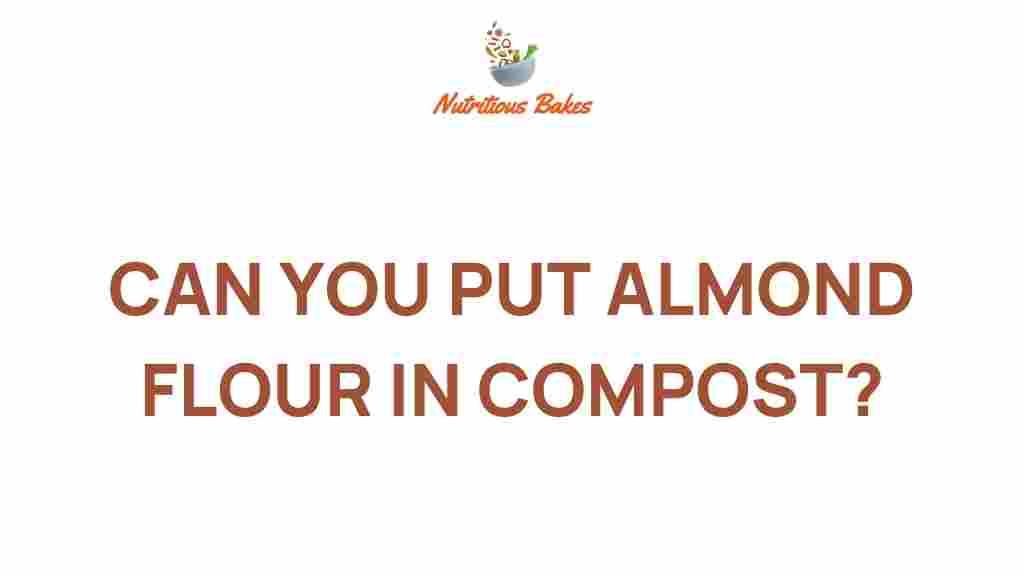Unpacking the Mystery: Can You Really Compost Almond Flour?
As more people embrace sustainable living, the question of what can and can’t be composted has gained significance. Among the many food waste items that often end up in the trash is almond flour. This article will delve into the composting potential of almond flour, exploring its benefits for gardening, soil health, and overall sustainability. We’ll also provide a step-by-step guide to composting almond flour, troubleshoot common composting issues, and highlight why it’s essential to incorporate eco-friendly practices into our daily lives.
Understanding Almond Flour
Almond flour is a popular ingredient made from finely ground almonds. Renowned for its versatility in baking and cooking, it’s a staple for those following gluten-free or low-carb diets. However, as with many food products, the question arises: what happens to almond flour when it’s no longer usable? Can it be included in your compost pile?
The Benefits of Composting
Composting is a natural process that transforms organic waste into nutrient-rich soil. By composting food scraps like almond flour, you contribute to reducing food waste while enriching your garden soil. Here are some key benefits:
- Reduces Landfill Waste: Composting keeps organic materials out of landfills, where they contribute to methane emissions.
- Nutrient-Rich Soil: Compost provides essential nutrients that help plants grow strong and healthy.
- Improves Soil Health: Adding compost enhances soil structure, moisture retention, and microbial activity.
- Eco-Friendly Practice: Composting is a simple yet impactful way to support environmental sustainability.
Can You Compost Almond Flour?
Yes, you can compost almond flour! However, there are some important considerations to keep in mind to ensure it aids in creating high-quality compost rather than causing issues.
Why Compost Almond Flour?
Almond flour is rich in nutrients and can be a beneficial addition to your compost pile. Here’s why:
- Nutrients: Almond flour contains protein, healthy fats, and fiber, which can enhance the nutrient profile of your compost.
- Carbon Source: It can serve as a carbon source (browns) in your compost, helping to balance nitrogen-rich materials (greens).
- Encourages Microbial Activity: The fats in almond flour can promote microbial growth, which is crucial for effective composting.
Step-by-Step Process: How to Compost Almond Flour
Composting almond flour can be straightforward if you follow these steps:
1. Gather Your Materials
Before you start, gather all the ingredients you’ll need:
- Almond flour (preferably expired or leftover)
- Green materials (fruit scraps, vegetable peels, grass clippings)
- Brown materials (dry leaves, cardboard, paper)
- Water
2. Set Up Your Compost Bin
Choose a compost bin or heap that provides adequate space and aeration. Ensure it’s located in a convenient area for easy access.
3. Layer Your Ingredients
Begin with a layer of brown materials to promote aeration. Add a layer of green materials, followed by a thin layer of almond flour. Alternate layers until your bin is full, ending with a brown layer.
4. Maintain Moisture
Water your compost pile as you build it, ensuring it’s damp but not soggy. Proper moisture levels encourage decomposition.
5. Turn Your Compost
Every few weeks, turn your compost to aerate it. This helps speed up the decomposition process and prevents odors.
Common Troubleshooting Tips
While composting almond flour is beneficial, there may be some challenges. Here are tips to troubleshoot common issues:
- Too Much Almond Flour: If you add too much almond flour, it can create a dense layer that may not decompose properly. Balance it with more greens and browns.
- Odors: If your compost emits a foul smell, it may be too wet or too high in nitrogen. Add more brown materials and aerate the pile.
- Pests: To deter pests, avoid adding large quantities of any one food item and cover your compost with browns.
What Not to Compost
When composting, it’s important to avoid certain items to maintain a healthy compost pile:
- Meat and dairy products
- Oils and greasy foods
- Pesticide-treated materials
- Diseased plants
The Impact of Composting on Soil Health
Composting not only helps reduce food waste, but it also plays a crucial role in enhancing soil health. Here’s how:
- Enhanced Nutrient Availability: Compost provides plants with vital nutrients such as nitrogen, phosphorus, and potassium.
- Improved Soil Texture: Adding compost improves soil structure, making it more porous and better at retaining moisture.
- Increased Microbial Activity: Healthy compost fosters beneficial microorganisms that contribute to plant health.
Gardening with Compost
Incorporating compost into your gardening routine can lead to bountiful yields. Here are several ways to use compost:
- Soil Amendment: Mix compost into the soil before planting to boost nutrient levels.
- Mulching: Use compost as a mulch to suppress weeds and retain moisture around plants.
- Top Dressing: Apply a layer of compost on top of existing soil to provide ongoing nutrients.
Conclusion: Embrace Eco-Friendly Practices
Composting almond flour is not only possible but also beneficial for your garden and the environment. By reducing food waste and enriching your soil, you contribute to a sustainable future. Remember to balance your compost pile with a variety of materials, and monitor its moisture and aeration for optimal results.
If you’re looking to dive deeper into the world of composting and gardening, check out this comprehensive guide on sustainable gardening practices. Embrace these eco-friendly habits and enjoy the fruits of your labor while supporting the planet.
By composting almond flour and other organic materials, we can all play a part in fostering a healthier planet, one compost pile at a time.
This article is in the category Tips and created by NutritiousBakes Team
